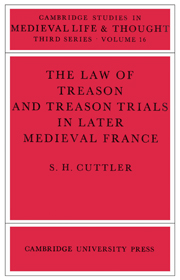Book contents
- Frontmatter
- Contents
- Dedication
- Preface
- Abbreviations
- Introduction
- 1 THE CONCEPT OF TREASON IN LATER MEDIEVAL FRANCE: LEGISTS, ‘COUTUMIERS’ AND TREATISE-WRITERS
- 2 THE CRIMES OF TREASON
- 3 JURISDICTION
- 4 PROCEDURE AND THE TRIAL OF PEERS
- 5 PUNISHMENT, FORFEITURE AND PARDON
- 6 TREASON AND THE CROWN 1328–1356
- 7 TREASON AND THE CROWN 1356–1380
- 8 TREASON AND THE CROWN 1380–1422
- 9 TREASON AND THE CROWN 1422–1461
- 10 TREASON AND THE CROWN 1461–1494
- Conclusion
- Bibliography
- Index
- Frontmatter
- Contents
- Dedication
- Preface
- Abbreviations
- Introduction
- 1 THE CONCEPT OF TREASON IN LATER MEDIEVAL FRANCE: LEGISTS, ‘COUTUMIERS’ AND TREATISE-WRITERS
- 2 THE CRIMES OF TREASON
- 3 JURISDICTION
- 4 PROCEDURE AND THE TRIAL OF PEERS
- 5 PUNISHMENT, FORFEITURE AND PARDON
- 6 TREASON AND THE CROWN 1328–1356
- 7 TREASON AND THE CROWN 1356–1380
- 8 TREASON AND THE CROWN 1380–1422
- 9 TREASON AND THE CROWN 1422–1461
- 10 TREASON AND THE CROWN 1461–1494
- Conclusion
- Bibliography
- Index
Summary
From the beginning of the period under review in this study, the interrelated notions of sovereignty and obedience had become integral parts of the law of treason. However imprecisely defined, that law thus expressed the nature of political authority. Since the king was sovereign, all the inhabitants of France were his subjects and owed him absolute obedience; furthermore, since he embodied public majesty, any treason against him was treason against the realm, and conversely any treason against the realm was treason against him. One need not belabour the fact that injured majesty was the central, all-encompassing aspect of treason in later medieval France; and that betrayal, though primordial, was but a subordinate one. Trahison could be committed against anybody, whereas lèsemajesté could be committed only against the king, the crown or the kingdom.
The wide scope of the law of treason developed naturally from this concept of lese-majesty. Given the poor state of public order and the frequent political crises – conditions that were aggravated, if not caused, by the English threat to the crown – one might argue that such a development of the law was also inevitable. The kings, though theoretically legibus absoluti, were nevertheless expected to rule by law, and consequently the law of treason provided for the monarchy a most important legal justification with which to anticipate charges of arbitrary repression or personal vengeance.
There were other dimensions of such a far-reaching law of treason. More severe than those for other crimes, the penalties for treason were intended to deter, control and influence as much as to punish effectively.
- Type
- Chapter
- Information
- The Law of Treason and Treason Trials in Later Medieval France , pp. 238 - 244Publisher: Cambridge University PressPrint publication year: 1982

